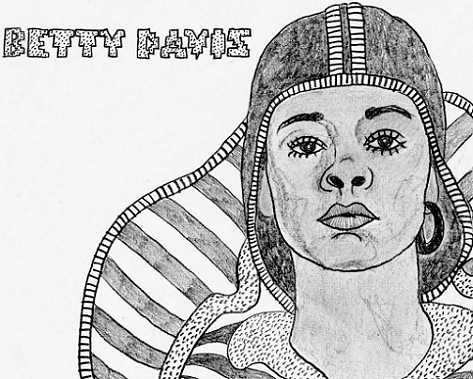
Ein zweites Mal Funk mit Betty Davis, yeah, sie hat uns zwar nur 4 Alben und einige Singles geschenkt, aber die sind allesamt hörenswert. I ain't nothin but a nasty gal now / A hey hey / I said, you said I was a bitch now / Oh... Didn't ya didn't ya / You said, I was a witch now / I'm gonna tell them why I'm gonna tell them why / You used to love it, ooh / To ride my broom honey / I used to love it ooh I used to love to / Ride the range with ya baby / Sing the song sing the song / I ain't nothin but a hey hey / Nothin but a / A hey hey. Betty Davis: I look back on those records, not so much that they were a reflection of myself, but more of a representation of a time period. It feels good to be getting recognition, but in the end, the only advice I have is be true to your art form. And by that, I mean do what's in your heart more so than what's in your head. Betty Davis' Musik wird von jungen Musiker*innen wie den Rapper Talib Kweli alias Talib Green oder der Soulsängerin Joi alias Joi Elaine Gilliam noch immer als großer Einfluss auf das eigene Schaffen gewertet. Talib Kweli: Betty Davis' musical journey is inspirational to me in many ways. Throughout her career, she remained pure in her art, and that in itself was too much for some of her peers. She influenced the greatest musicians of our time while she was their contemporary, and her legacy influenced a whole new generation of true artists. All respect to sister Betty Davis. Joi: Like so many brilliant women in music whose song of praise goes unsung, Betty Davis was and is a figure in the professional music landscape that deserves to be exalted, she has been the ultimate muse for so many men, so many genres of music… jazz, rock, soul, funk, r&b, punk. I’m so glad I have been influenced by her. Neither my life nor my music has been the same since. Ja, Betty Davis war eine der großen Funkmusikerinnen, die es leider nie wirklich schaffte große Anerkennung zu erlangen und bereits 1979 ihren Abschied von der Popwelt nahm. Ich liebe Betty Davis und ich wünsche mir, dass ihr alle, alle, alle endlich ihre Musik hört und bessere Menschen werdet, denn dafür hat sie sie schließlich gemacht. Hugh! Ich hab gestern einen ganz tollen Song aus dem Jahr 1957 entdeckt. Wow! Der Musikzeitschrift Rolling Stone liegt immer eine CD bei, "New Voices", "New Noises", "Rare Trax", "Rolling Stone Exclusive" etcetera, der Nummer 4/2016 lag die CD "Miles Deep - Neun ausgewählte Tracks aus dem Archiv von Miles Davis" bei, die ich mir gestern beim Zimmerradfahren auflegte. Der Song heißt "The Maids Of Cadiz", er wurde von Léo Delibes geschrieben und von Gil Evans neu arrangiert. Léo Delibes war kein Jazzmusiker, sondern ein französischer Komponist, der 1836 in Saint-Germain-du-Val als Sohn eines Postboten geboren wurde und 1891 in Paris verstarb. Auf die Idee Klassik mit Jazz zusammenzudenken brachte Miles Davis der Komponist und Waldhornbläser Gunther Schuller, der ihm auch die Zusammenarbeit mit dem kanadischen Arrangeur Gil Evans empfahl. Bei "The Maids Of Cadiz" spielt Miles Davis übrigens nicht Trompete sondern Flügelhorn. Hmm, meist ziehe ich die Musik von Betty Davis der Musik von Miles Davis vor, aber die Alben "Nefertiti" 1968 und "In A Silent Way" 1969 von ihm find ich toll. Zurück zu Betty Davis, um die es hier eigentlich geht, ihr Song "Nasty Gal" ist auf der 2005 bei Vampisoul Records erschienenen CompilationCD "This Is It!" zu finden. Zumindest diese Compilation sollte in jeder Popsammlung Platz finden, yeah. Hört euch auch den Song "My Mother's House" 1972 von Emily an. Emily hieß mit vollem Namen Emily Bindinger und hat 1972 bei Pathé Records das Album "Emily" veröffentlicht, es wurde 2013 bei RPM Records als CD wiederveröffentlicht. Eine Zeit lang war sie auch Mitglied der A Cappella Group The Accidentals. So, jetzt schwing ich mich aufs Zimmerfahrrad und strample eine CD lang. Im Alter muss man schaun, das man fit bleibt, haha.